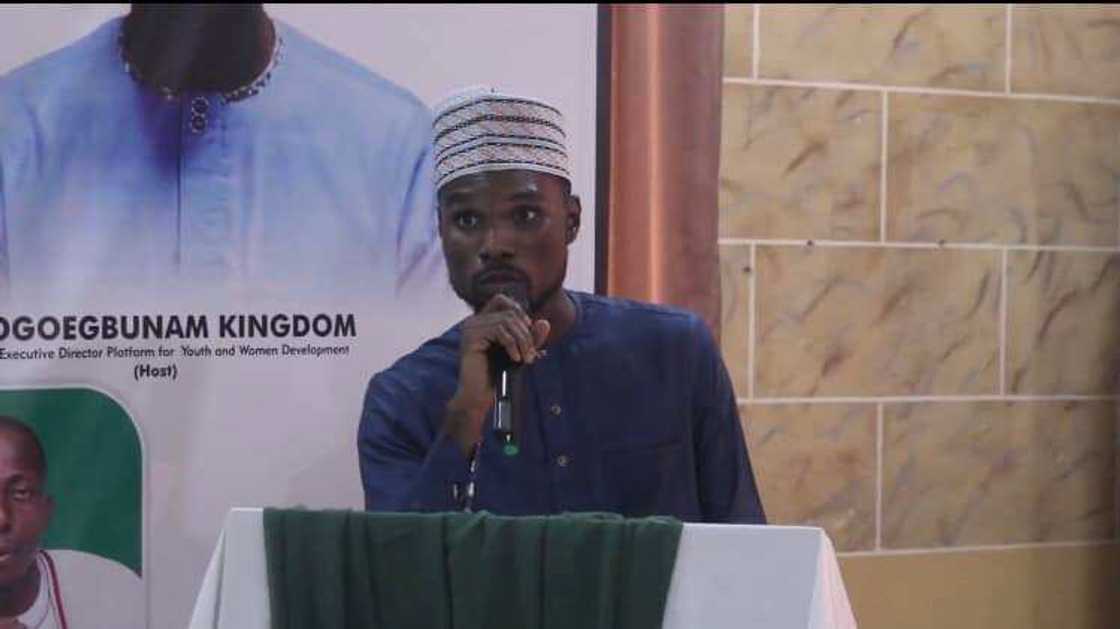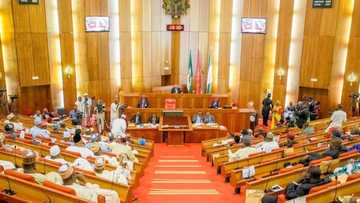Constitution Amendment: Youth Advocate Reveals 3 Bills Rejected by National Assembly Which Should Be Passed
- The rejection of some Constitutional Amendment bills by the National Assembly has continued to generate heated reactions
- Kingdom Ogoegbunam, the executive director of the Platform for Youth and Women Development, mentioned some bills rejected by the lawmakers which should have passed
- The youth advocate urged the National Assembly to reconsider the rejected bills before moving to the next process of the constitutional amendment
FCT, Abuja - On Tuesday, March 1, the National Assembly voted on 68 amendments to the 1999 Constitution.
Both chambers voted separately on the amendments during plenary sessions. While the Senate passed 47 of the 68 constitution amendment bills, it rejected the remaining 21.
Also, the House of Representatives passed 53 bills and rejected 15.
While both chambers agreed on some of the bills, they differed on others. For instance, while the Senate rejected the bill seeking to provide a timeline for civil and criminal cases, the House of Reps passed it.

Read also
Electoral act: How 9th assembly made Buhari sign bill into law, Senate president’s aide, Ezrel

Source: Facebook
PAY ATTENTION: Subscribe to Digital Talk newsletter to receive must-know business stories and succeed BIG!
However, Ahmad Lawan, the president of the Senate and chairman of the National Assembly had said before the voting that bills that pass in only one chamber will not make the list of those that will be sent to the state houses of assembly to be voted on.
As a result, only a total of 43 bills made the cut out of the 68.
Two-thirds of the state assemblies will have to pass the bills before it is now sent to the president for assent.
Rejection of “timeline for civil and criminal cases” bill disappointing - Ogoegbunam
Speaking on the constitutional amendment process, the executive director of the Platform for Youth and Women Development (PAYWDEV), Ogoegbunam Kingdom, congratulated Nigerians and the National Assembly.
Ogoegbunam, however, expressed disappointment over the Senate’s failure to pass the bill seeking to provide a timeline for civil and criminal cases.
The bill which is the 19th on the Senate list reads fully:
“A Bill For an Act to alter the Constitution of the FRN, 1999 to provide timelines within which civil and criminal cases are heard and determined at trial and appellate courts in order to eliminate unnecessary delay in justice administration and delivery; and for related matters.”
Ogoegbunam commended the House of Reps for passing the bill and urged the National Assembly to adopt it in its harmonised version to be sent to the state Houses of Assembly.
He noted that the bill if passed “will entirely reform the judiciary, save cost and save time of the courts.”
“In our courts there are cases lasting 20-30 years which is not necessary and should attract severe fines,” Ogoegbunam said, adding that a case should not exceed 12-15 months.
He also shared the view of Vice President Yemi Osinbajo who had recently advocated stiff penalties for unnecessary adjournment of cases.
Rejection of gender bills, discrimination against women - Ogoegbunam
Meanwhile, the director of PAYWDEV also condemned the rejection of the bill seeking to provide for special legislative seats for women by both chambers.
He regarded as “discrimination against women” the National Assembly’s rejection of the two major bills which concern women participation in politics by both chambers.
Below are the full descriptions of the two bills:
“A Bill for An Act to alter the provision of the Constitution of the Fed Rep of Nigeria, 1999 to provide for affirmative action for women in political party administration and for related matters.
“A Bill For an Act to alter the provisions of the Constitution of the Federal Republic of Nigeria, 1999 to provide for special seats for women in the National and State Houses of Assembly; and for related matters.”
Ogoegbunam urged the National Assembly to review its decisions on the gender bills. He added that “women control a huge majority and are ripe for any position in the country including the Presidency”.
He called for the timely intervention of the Presidency and also tasked Civil Society Organisations to engage the National Assembly to ensure a proper review of the 1999 Constitution Amendment.
Nigeria should adopt 1963 constitution, says Ogoegbunam
The youth advocate also said Nigeria should have opted for a new constitution or adopt and amend the 1963 Macphersons constitution instead of amending the 1999 constitution.
He noted that the 1963 constitution devolved powers to regions and reduced the powers of the central government.
“It provided for legislatures in every region and an executive council and ensured true federalism,” Ogoegbunam told Legit.ng.
He stressed that the 1999 constitution failed to empower states, adding that it made the centre too powerful.
The PAYWDEV's director also said that the 1999 constitution reduced powers of resource control by states and did not provide for state police and regionalism which would have ensured good governance at the local/state level.
2023: Rotational presidency
Ahead of the 2023 general elections, Ogoegbunam said Nigerians must begin to pay attention to the Alex Ekwueme 1995 constitutional amendment recommendations on rotational presidency.
He said the recommendation on non-renewable one term of five years for the presidency and state governors should be considered.
“If this can be implemented, it will be equitable, time saving and ensure collective representation of every region in the centre,” the youth advocate said.
Nigeria won’t get better unless gender equality is seen as a solution, says Ndi Kato
In another report, the Executive Director of Dinidari Africa, Ndi Kato has said Nigeria would only be better when laws that enable the rights of women to survive, freely participate in governance and decision-making are given priority.
Kato said this while reacting to the rejection of about five gender-related bills by lawmakers during the Constitution Amendment at the National Assembly on Tuesday, March 1.
According to her, the action has further shrunk the space for women’s participation in governance and decision-making.
Source: Legit.ng





